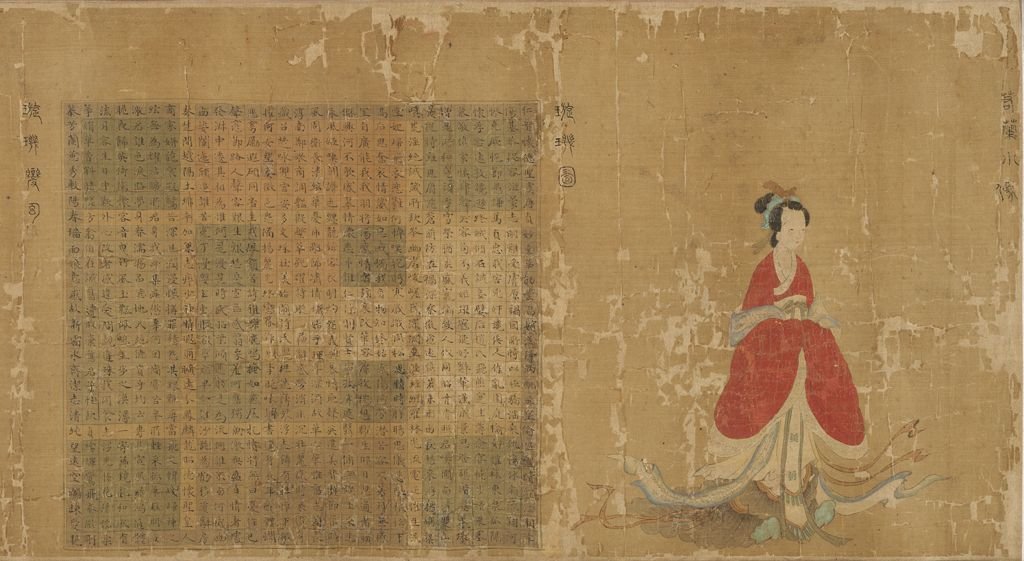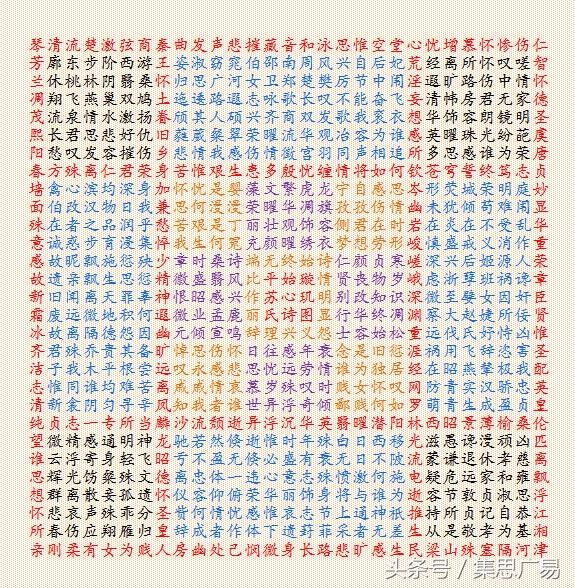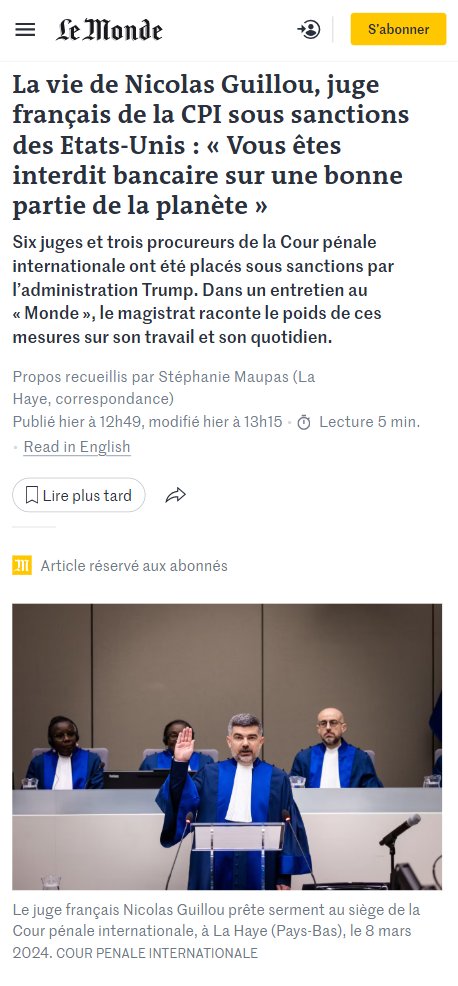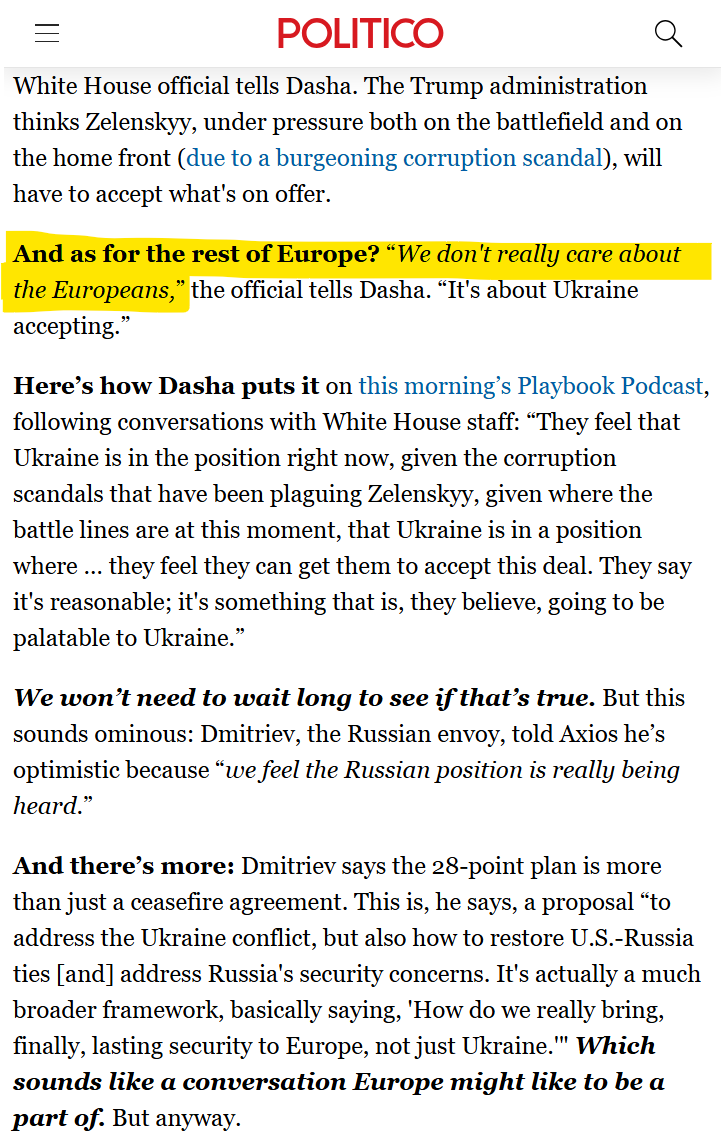If you weren't yet convinced that Europe is stepping into its century of humiliation, that ought to do it x.com/BehizyTweets/s…
Trump says that the US need Greenland "for national security purposes" and "for the free world", and claims that "people really don't even know if Denmark has any legal right to it" (which is 100% false).
Would he ever dare say this with regards to Chinese or Russian territory? Not in a million years. But he sees that not only is Europe weak but also in the absolutely disastrous strategic situation where it is "defended" by him! Which means that Europe is effectively trapped in a mob-style protection racket and is about to relearn the old geopolitical adage (attributed to Thucydides): "the strong do what they can and the weak suffer what they must".
So many ironies here of course, starting with Trump's claim about protecting the "free world" through territorial annexation.
Second irony is that Europe's hysterical fixation on Russian imperialism - more phantom than reality given Russia's demonstrated capabilities - has led it to sleepwalk into the clutches of an actual empire that now casually discusses carving it up.
Last but not least, probably the bigger irony is that no-one in the whole world is going to care because of Europe's double-standards and hypocrisy in its own dealings with the rest of the world, and Gaza in particular. Since the very beginning of Gaza (and again yesterday: x.com/RnaudBertrand/…) I wrote that the bigger meaning of Europe's response would be the death of any pretense to an global order based on international law.
And that's exactly where we are. By choosing to openly abandon even the appearance of principles Europe has essentially announced it was ok with "might makes right". A monumentally stupid thing to do when you aren't mighty yourself...
Europe's leaders (if you can call them so), in their eagerness to be "good allies" by supporting the violation of international law in Gaza, have effectively signed their own continent's permission slip for future dismemberment. They've forgotten that principles aren't just moral luxuries - they're practical shields, and once broken for others, they no longer protect you either.
Their forgetting this is especially egregious given Europe's own history. Because we've we've seen this many times before and perhaps the most salient example is the response - or absence thereof - to Mussolini's Italy invading Ethiopia in 1935, which resulted in hundreds of thousands of Ethiopian deaths.
Despite Ethiopia being a member of the League of Nations, the UN-ancestor meant to prevent exactly such aggression, major powers chose to protect their fellow European power rather than uphold international law. With the consequences we all know about: the death of the League of Nations as a credible institution and the clear message to other European powers that hunting season on weaker nations and peoples was officially open. Within a few months afterwards, Hitler started remilitarizing the Rhineland.
The century of humiliation that Europe is walking into has a uniquely self-inflicted quality to it, stemming from its own moral corruption and strategic myopia. Unlike China, which at least could claim to have been blindsided by European imperialism, Europe is actively participating in dismantling the very legal protections that could shield it from stronger powers. Which means it won't even have the moral authority to protest.
Trump says that the US need Greenland "for national security purposes" and "for the free world", and claims that "people really don't even know if Denmark has any legal right to it" (which is 100% false).
Would he ever dare say this with regards to Chinese or Russian territory? Not in a million years. But he sees that not only is Europe weak but also in the absolutely disastrous strategic situation where it is "defended" by him! Which means that Europe is effectively trapped in a mob-style protection racket and is about to relearn the old geopolitical adage (attributed to Thucydides): "the strong do what they can and the weak suffer what they must".
So many ironies here of course, starting with Trump's claim about protecting the "free world" through territorial annexation.
Second irony is that Europe's hysterical fixation on Russian imperialism - more phantom than reality given Russia's demonstrated capabilities - has led it to sleepwalk into the clutches of an actual empire that now casually discusses carving it up.
Last but not least, probably the bigger irony is that no-one in the whole world is going to care because of Europe's double-standards and hypocrisy in its own dealings with the rest of the world, and Gaza in particular. Since the very beginning of Gaza (and again yesterday: x.com/RnaudBertrand/…) I wrote that the bigger meaning of Europe's response would be the death of any pretense to an global order based on international law.
And that's exactly where we are. By choosing to openly abandon even the appearance of principles Europe has essentially announced it was ok with "might makes right". A monumentally stupid thing to do when you aren't mighty yourself...
Europe's leaders (if you can call them so), in their eagerness to be "good allies" by supporting the violation of international law in Gaza, have effectively signed their own continent's permission slip for future dismemberment. They've forgotten that principles aren't just moral luxuries - they're practical shields, and once broken for others, they no longer protect you either.
Their forgetting this is especially egregious given Europe's own history. Because we've we've seen this many times before and perhaps the most salient example is the response - or absence thereof - to Mussolini's Italy invading Ethiopia in 1935, which resulted in hundreds of thousands of Ethiopian deaths.
Despite Ethiopia being a member of the League of Nations, the UN-ancestor meant to prevent exactly such aggression, major powers chose to protect their fellow European power rather than uphold international law. With the consequences we all know about: the death of the League of Nations as a credible institution and the clear message to other European powers that hunting season on weaker nations and peoples was officially open. Within a few months afterwards, Hitler started remilitarizing the Rhineland.
The century of humiliation that Europe is walking into has a uniquely self-inflicted quality to it, stemming from its own moral corruption and strategic myopia. Unlike China, which at least could claim to have been blindsided by European imperialism, Europe is actively participating in dismantling the very legal protections that could shield it from stronger powers. Which means it won't even have the moral authority to protest.
• • •
Missing some Tweet in this thread? You can try to
force a refresh














